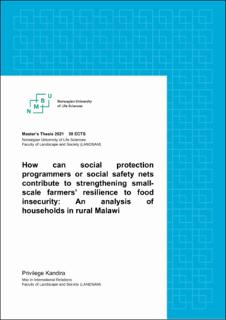| dc.description.abstract | Small-scale farmers are essential players in achieving food and nutrition security and sustainable livelihoods for the world. 84% of the worlds’ estimated 608 million farms are small-scale farms (family farms), operating less than 12% of the agricultural land yet manage to produce a third 35% of the world’s food. However, the disproportionate effects of climate change are much more affecting these small-scall farmers; threatening the goal to achieve food and nutrition security. Increasing their resilience to climate change can help strengthen these small-scale farmers and achieve food and nutrition security starting from a household level. However, to do achieve this, it should be noted that social programmers and safety nets need to be context-sensitive, paying attention particular attention to the different factors (particularly from the lowest level household level) that threaten the small-scale farmers and food security. The goal of this study was to understand the complex realities on the ground through the exploration of differentiated vulnerabilities, capabilities, and challenges of rural Households in Malawi. The knowledge produced can then be used to make policy recommendations that can contribute to strengthening small-scale farmer’s resilience to climate change and food and nutrition security. The study was carried out in 5 Malawi districts (Dowa, Kasungu, Mchinji, Mzimba, and Rumphi). Data was collected in total from 1118 households out of the selected 11 extension planning areas. The study established that small-scale farmers’ households are different in characteristics and demographics and that gender inequality still exists in rural Malawi. The figures showed that selected districts are dominated by male-headed households and that they have more access to resources compared to their male counterparts. The study also showed that there are household differences in terms of food security, female-headed households are more vulnerable to food and nutrition than male-headed households. Moreover, the study revealed that households use different coping strategies, however, there are some which are more commonly used than others, such as reducing food portions at mealtimes and reducing the number of meals per day. The paper then concludes that to strengthen the small-scale farmers, policymakers and programmers should create targeted programs and policies that respond and are sensitive to these household differences. | en_US |

